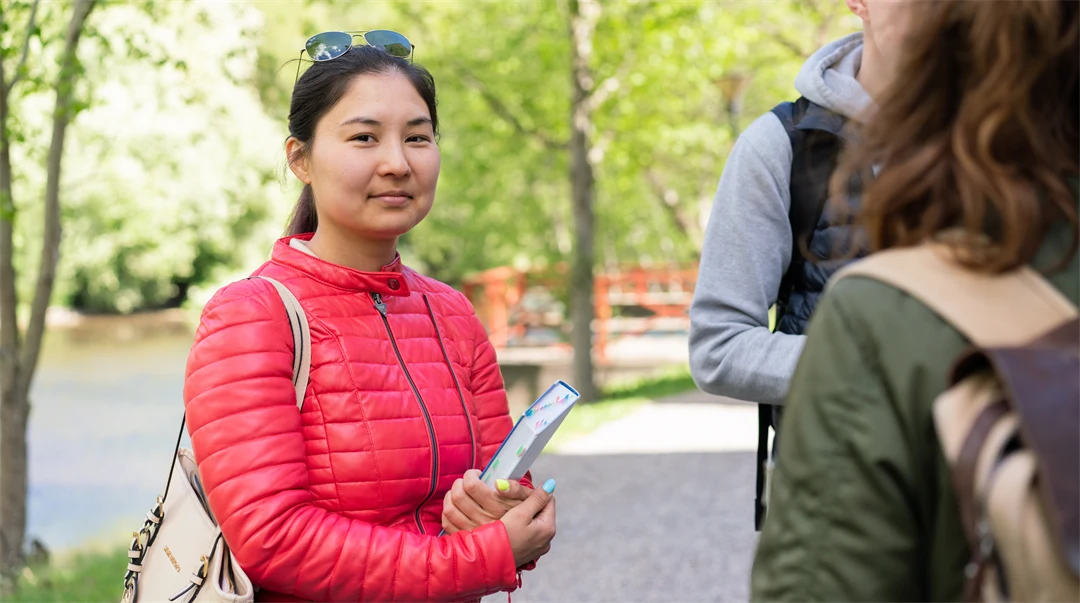Master by Research in Electrical Engineering, 120 Credits
The Master by Research programme in Electrical Engineering targets those who are highly motivated to develop skills and knowledge for future career in academic, industrial or public research and development. This is also an excellent preparation for future doctoral studies.
- Start: Spring semester 2025
- Specialisation: Autonomous Sensors
- Level : Second cycle
- Language of instruction: English
- Code: MIU-D4M30
- Study form: Campus
- Study pace: 100%
- Campus: Sundsvall
- Start: Spring semester 2025
- Specialisation: Intelligent Systems
- Level : Second cycle
- Language of instruction: English
- Code: MIU-D4M32
- Study form: Campus
- Study pace: 100%
- Campus: Sundsvall
- Start: Spring semester 2025
- Specialisation: Intelligent Systems
- Level : Second cycle
- Language of instruction: English
- Code: MIU-D4390
- Study form: Campus
- Study pace: 100%
- Campus: Sundsvall
- Start: Spring semester 2025
- Specialisation: Autonomous Sensors
- Level : Second cycle
- Language of instruction: English
- Code: MIU-D4140
- Study form: Campus
- Study pace: 100%
- Campus: Sundsvall
- Start: Autumn semester 2025
- Specialisation: Autonomous Sensors
- Level : Second cycle
- Language of instruction: English
- Code: MIU-D2M61
- Study form: Campus
- Study pace: 100%
- Campus: Sundsvall
- Start: Autumn semester 2025
- Specialisation: Detectors and Multispectral Measurement Systems
- Level : Second cycle
- Language of instruction: English
- Code: MIU-D2M53
- Study form: Campus
- Study pace: 100%
- Campus: Sundsvall
- Start: Autumn semester 2025
- Specialisation: Intelligent Systems
- Level : Second cycle
- Language of instruction: English
- Code: MIU-D2M41
- Study form: Campus
- Study pace: 100%
- Campus: Sundsvall
- Start: Autumn semester 2025
- Specialisation: Smart Cameras
- Level : Second cycle
- Language of instruction: English
- Code: MIU-D2M91
- Study form: Campus
- Study pace: 100%
- Campus: Sundsvall
About the programme
The Master by Research programme in Electrical Engineering is the right choice for students who wish to specialize in electronics and aim for a career in research or in the electronics industry. During the programme, you work together with researchers on a research problem in one of Mid Sweden University’s largest research environments. You mix your research with the academic studies you need to solve the problem.
As a student, you are part of a research team at the research centre STC (Sensible Things that Communicate) that develops sensor-based systems and services in the fields of electronics and computer technology. Together with researchers, you take part in a research project and work both independently and together with others.
The education consists of both courses on an advanced level and project work, and ends with an individual Master’s thesis during the last semester. Having completed the programme, students should be able to understand and assess the possibilities and limitations of different technologies.
SPECIALIZATIONS:
AUTONOMOUS SENSORS
Sensors and sensor systems are increasingly used in many application domains, such as industrial and process automation, environmental monitoring, and smart cities. A consequence of this is a growing demand for these systems to operate more autonomously and to be less dependent on existing infrastructures for energy supply and data handling. This specialization deals with enabling technologies for autonomous sensors.
SMART CAMERAS
Smart cameras are typically used as sensors for contactless measurements of parameters associated with objects and surfaces within areas being monitored, often in combination with active illumination. These cameras are often connected to a computer communication network. Smart cameras typically include computational resources for refinement of captured data into information. This refinement leads to minimization of communicated data volumes. Robots, autonomous vehicles and process automation are examples of application areas. This specialization deals with technologies for the design of smart cameras.
DETECTORS AND MULTISPECTRAL MEASUREMENT SYSTEMS
Multispectral measurement systems are important for selective measurement situations, such as optimization of industrial processes and environmental monitoring. Modern sensor technology can verify if a final product contains the correct composition or if waste contains harmful substances. The challenge is fast and effective identification of substances or constituents. The specialization deals with questions ranging from the function of energy resolved X-ray detectors to integration into a measurement system.
INTELLIGENT SYSTEMS
Machine learning and deep learning systems are becoming increasingly important in the development of both society and industry. These technologies are important parts of data-driven development that is integrated into cloud solutions but is becoming more and more an important part of measurement systems and embedded systems. The specialization deals with intelligent systems focused on embedded systems, but the knowledge can also be used in several other areas.
Entry requirements
English course 6 from Swedish Upper Secondary School (Gymnasium) or the equivalent. Specific requirements for the specializations:
- Autonomous Sensors: Degree of Bachelor, Degree of Bachelor of Science in Engineering in Electrical Engineering/Electronics, Computer Engineering, or Physics (at least 180 credits), or equivalent, with at least 22.5 credits (22.5 ECTS) in Mathematics/Applied Mathematics and 45 credits (45 ECTS) in Electrical Engineering, including course modules with digital electronics, microcontrollers and analog electronics, as well as a degree project of at least 15 credits in an area that is relevant for the specialization.
- Power Electronics: Degree of Bachelor, Degree of Bachelor of Science in Engineering in Electrical Engineering/Electronics, Computer Engineering, or Physics (at least 180 credits), or equivalent, with at least 22.5 credits (22.5 ECTS) in Mathematics/Applied Mathematics and 45 credits (45 ECTS) in Electrical Engineering, including course modules with circuit theory and analog electronics, as well as a degree project of at least 15 credits in an area that is relevant for the specialization.
- Smart Cameras: Degree of Bachelor, Degree of Bachelor of Science in Engineering in Electrical Engineering/Electronics, Computer Engineering, or Physics (at least 180 credits), or equivalent, with at least 22.5 credits (22.5 ECTS) in Mathematics/Applied Mathematics, including Fourier and Laplace transforms, and 45 credits (45 ECTS) in Electrical Engineering, including course modules with basic imperative programming, as well as a degree project of at least 15 credits in an area that is relevant for the specialization.
- Detectors and Multispectral Measurement Systems: Degree of Bachelor, Degree of Bachelor of Science in Engineering in Electrical Engineering/Electronics, Computer Engineering, or Physics (at least 180 credits), or equivalent, with at least 22.5 credits (22.5 ECTS) in Mathematics/Applied Mathematics and 45 credits (45 ECTS) in Electrical Engineering, including course modules with sensors and instrumentation, as well as a degree project of at least 15 credits in an area that is relevant for the specialization.
- Intelligent Systems: Degree of Bachelor, Degree of Bachelor of Science in Engineering in Electrical Engineering/Electronics, Computer Engineering, or Physics (at least 180 credits), or equivalent, with at least 22.5 credits (22.5 ECTS) in Mathematics/Applied Mathematics and 45 credits (45 ECTS) in Electrical Engineering or Computer Engineering, including course modules with microcontroller programming and machine learning, as well as a degree project of at least 15 credits in an area that is relevant for the specialization.
Selection
To apply, visit www.universityadmissions.se.
Required documents:
- Certificates and diplomas from previous university studies. The universities where you studied must be internationally recognized higher education institutions (university or university college).
- Transcripts of completed courses and grades for each semester included in your degree.
- Proof of English language skills equivalent to English studies at upper secondary (high school) level in Sweden, i.e. English 6/English course B.
- In addition, you must submit a letter stating your interest in the programme, and a ranking of your interests if more than one study project is offered to you.
You should also describe your background and its relevance to the subject in a Curriculum Vitae (CV), with your Bachelor’s thesis, individual projects, project portfolio and any experience that you wish to refer to attached.
Please note that your online application is complete when you have submitted your supporting documentation. Upload these documents to your personal account at universityadmissions.se as soon as possible but no later than (three weeks after the application deadline. For more information go to https://www.universityadmissions.se/intl/start.
Title of qualification
Masterexamen med huvudområdet elektroteknik, translated into Master of Science (120 credits) with a major in Electrical Engineering.
After the programme
After having completed your Master’s thesis, there are good opportunities to work in research within academia or trade and industry, or in product development with new technology.
Work experience contact
During the programme, you will meet both researchers and companies that our research centre cooperates with. This way, you get useful contacts and experiences to prepare you for your future career.


